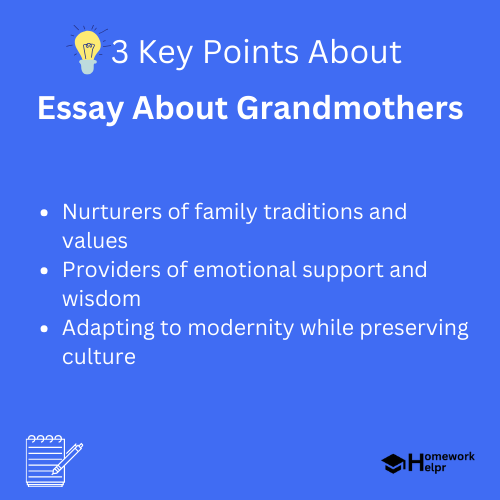📝 Summary
Grandmothers play a profound and< strong> multifaceted role in family life, serving as sources of wisdom, cultural preservation, and emotional support. They often act as caregivers, mediators, and teachers, bridging the gap between generations. Their unwavering< strong> love nurtures deep emotional connections and provides a safe haven for grandchildren. In today‚’ technological world, grandmothers adapt while maintaining traditional values, enriching family relationships through platforms like social media. Through their stories, teachings, and affection, grandmothers leave a lasting imprint on our lives.}
Essay About Grandmothers
The role of a grandmother in a family is profound and often cherished by all members. A grandmother is not just a matriarch but a reservoir of wisdom, traditions, and unconditional love. Whether it‚’ through their age-old recipes, stories from the past, or the simple warmth of their presence, grandmothers leave a lasting imprint on our lives that shapes our character and values.
Many people refer to their grandmother with affectionate nicknames reflecting the bond shared between them. Some call them “Nana,” “Granny,” or even “Abuela,” depending on the culture and tradition. Each name resonates with a distinct intimacy, showcasing the unique bond that exists. Grandmothers often serve as a bridge between generations, allowing the past to connect with the present.
Importance of Grandmothers in Family Life
Grandmothers play a crucial role in the family structure. They can be the best storytellers, learning from their experiences and sharing invaluable lessons with younger generations. They often serve as the keepers of family traditions and memories, ensuring that the legacy is never forgotten. Their role can be categorized as:
- Caregivers: Many grandmothers step into the role of caregivers, providing essential support during the early stages of a child‚’ life, allowing parents to work or pursue their goals.
- Mediators: They often act as mediators in family disputes, helping to resolve conflicts and ensuring harmony within the family.
- Teachers: Grandmothers share cultural values, ethics, and practical skills, teaching craft, arts, or even life skills.
Their involvement in family life strengthens bonds and promotes values of compassion, patience, and kindness.
Wisdom and Knowledge
One of the most profound qualities of a grandmother is the store of wisdom she possesses. Through their life experiences, they have encountered many challenges, making them excellent advisors. When a grandchild faces problems, they can seek advice and care from their grandmother. For example, if a grandchild is facing difficulties at school, a grandmother may share stories of her own challenges and how she overcame them, providing emotional and practical support.
Moreover, they often share valuable knowledge regarding health, relationships, and financial wisdom. They can teach the importance of saving money and managing it wisely, often sharing their experiences of managing households during tough times.

❓Did You Know?
Did you know that in many cultures, grandmothers are considered the “glue” that keeps the family together? They often host family gatherings and play significant roles in cultural and religious festivities.
Cultural Preservation
Grandmothers are vital in preserving cultural identity. They teach grandkids religious practices, traditional foods, and stories that resonate with family heritage. For instance, during festivals, they often showcase rituals and cultural activities that have been passed down through generations. Often, you might find grandmothers bringing traditional recipes back to life, like making homemade ravioli or baking simple ginger cookies.
These culinary lessons are filled with joy, laughter, and a sprinkle of nostalgia, allowing grandchildren to bond with their roots and understand their ancestry. Grandmothers become sources of cultural authenticity, making the process of learning about traditions engaging and fun.
The Emotional Bond
The emotional connection between a grandchild and a grandmother can be profoundly nurturing. Grandmothers often provide a safe haven, free of judgment, where grandchildren can vent their feelings, whether they are sad, happy, or confused. This bond nurtures a deep sense of understanding and trust.
For example, on tough days, children might find solace in a grandmother‚’ embrace, knowing that she will always listen without criticism. This creates a foundation of emotional intelligence that benefits their future relationships and emotional well-being.
Definition
Emotional Intelligence: The ability to understand and manage your own emotions, as well as the emotions of others.
Grandmothers and Modernity
In today‚’ fast-paced world, where technology and modernity dominate, grandmothers often adapt while preserving their traditional values. Many grandmothers learn to use technology to stay connected with their grandchildren, sharing pictures, videos, and stories through social media platforms. This adaptation helps breach the generational gap and promotes better communication.
This technology-savvy adaptation enables the exchange of ideas, stories, and emotional connections, further enriching family relationships. In turn, grandchildren appreciate the practicality and resilience of their grandmothers. They learn that change is constant, but values remain enduring.
Conclusion
In conclusion, grandmothers hold a special place in our hearts and homes. Their impact on our lives is significant and multifaceted, contributing to our upbringing, cultural identity, and emotional well-being. With their wisdom, love, and nurturing spirit, they teach us valuable life lessons while weaving a tapestry of family stories that resonate across generations. Their role transcends time and continues to be critical, even in a world driven by rapid change. Truly, grandmothers are the unsung heroes in our lives, deserving our love, respect, and appreciation.
Related Questions on Essay About Grandmothers
What roles do grandmothers play in families?
Answer: They act as caregivers, mediators, and teachers.
How do grandmothers preserve cultural identity?
Answer: They teach traditions, stories, and recipes to grandchildren.
Why are grandmothers considered the ‘glue’ of families?
Answer: They host gatherings and maintain family connections.
How do grandmothers adapt to modern society?
Answer: They learn technology to connect with grandchildren.
